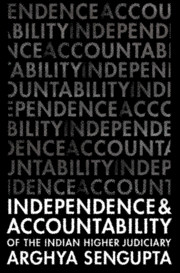Book contents
- Frontmatter
- Dedication
- Contents
- Acknowledgements
- List of Abbreviations
- List of Cases
- List of Statutes
- 1 Introduction
- PART I THE INDIAN EXPERIENCE
- PART II A CONCEPTUAL ANALYSIS
- PART III TYING THE STRANDS
- Epilogue: The Moment the Judiciary Came Out
- Appendix Post-Retirement Employment of Judges in Government-Appointed Positions
- Bibliography
- Index
1 - Introduction
Published online by Cambridge University Press: 26 April 2019
- Frontmatter
- Dedication
- Contents
- Acknowledgements
- List of Abbreviations
- List of Cases
- List of Statutes
- 1 Introduction
- PART I THE INDIAN EXPERIENCE
- PART II A CONCEPTUAL ANALYSIS
- PART III TYING THE STRANDS
- Epilogue: The Moment the Judiciary Came Out
- Appendix Post-Retirement Employment of Judges in Government-Appointed Positions
- Bibliography
- Index
Summary
No Supreme Court and no judiciary can stand in judgment over the sovereign will of Parliament representing the will of the entire community. If we go wrong here and there it can point it out, but in the ultimate analysis, where the future of the community is concerned, no judiciary can come in the way.
—Jawaharlal Nehru, 1st Prime Minister of India, 1949The judicial system has an important role to play ultimately in ensuring better public governance…. There is no area where the judgments of the Supreme Court have not played a significant contribution in governance—good governance—whether it be environment, human rights, gender justice, education, minorities, police reforms, elections and limits on constituent powers of Parliament to amend the Constitution. This is only illustrative.
—Justice Y. K. Sabharwal, 36th Chief Justice of India, 2006At the time of the Constitution of India coming into force, few could have imagined the public prominence the Indian higher judiciary, comprising the Supreme Court of India and 24 High Courts in the states, would achieve seven decades hence. Nehru's conceptualisation of the judiciary as a hands-off guardian, pointing out governmental errors ‘here and there’, is today a relic that has been consigned to the entrails of history. Today, the higher judiciary, the Supreme Court in particular, as Justice Sabharwal's opinion proclaims, is an institution integral to the governance of the country. With liberalised rules of standing, wide powers and a range of remedies, the court is frequently called upon to decide knotty questions, on matters affecting everyday life in India. It sees itself as a court with a duty ‘to ensure the rule of law’ wherever and whenever infractions may occur. Consequently, in public perception, it has, in the evocative words of a commentator, transformed itself into a ‘Supreme Court for Indians’.
For an institution as powerful and prominent in the public mind, it is curious that concomitant attention has not been paid to analysing its internal processes. Key internal processes—appointment of judges, transfer of judges between High Courts and impeachment of judges—have seldom been the subject of sustained critical attention. The last analytical account to critique the system of judicial appointments and transfers was published in 1996.
- Type
- Chapter
- Information
- Publisher: Cambridge University PressPrint publication year: 2019



